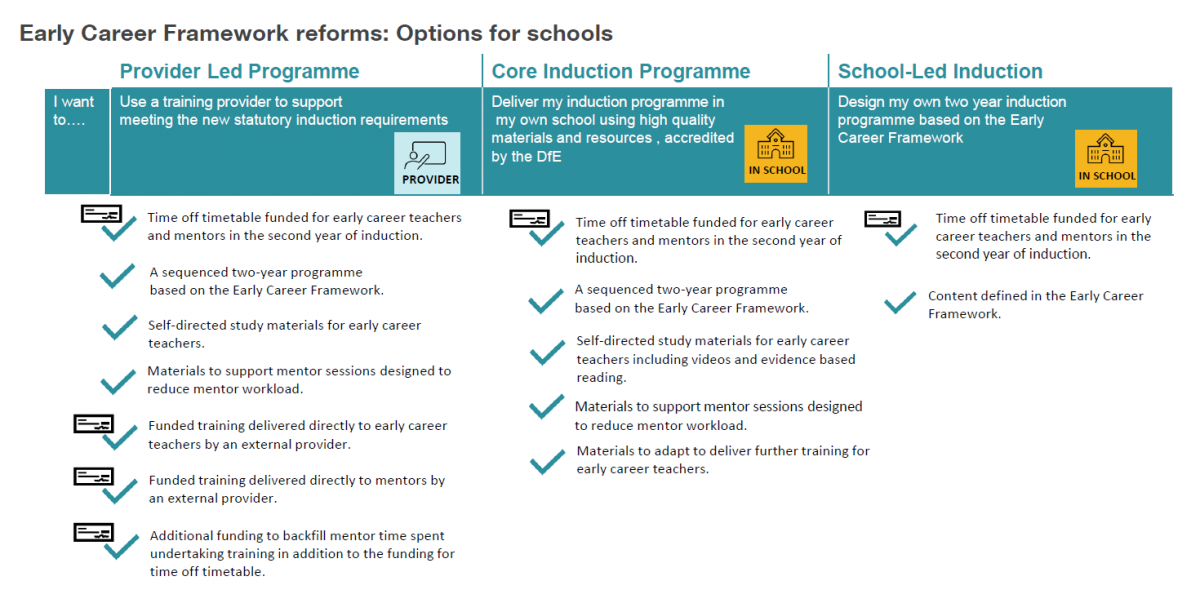- Latest NewsUp-to-date articles giving you information on best practice and policy changes.
- Skills AuditsEvaluate your skills and knowledge, identify gaps and determine training needs.
Early career framework and induction reforms: actions and FAQs
From September 2021, statutory arrangements for teacher induction in England are changing. What do schools need to know and do?
Go straight to
Key terminology
- Appropriate body (AB) – it’s the role of the appropriate body to check that early career teachers receive appropriate support and assessment.
- Early career framework (ECF) – sets out what early career teachers are entitled to learn about when they start their careers.
- Early career teacher (ECT) – a teacher in their first two years post initial teacher training – replaces NQT.
- Teaching school hubs (TSH) – school-led centres of excellence for teacher and leadership training and development.
See the references section further below for relevant links. The early career framework reforms overview is a useful starting point.
What’s changing?
The biggest change is the move from a one-year induction period to two years. During this time all early career teachers (ECTs) will be entitled to a programme of training and support based on the early career framework (ECF).
Previously schools have devised their own induction training, and provision and support have varied from setting to setting. Now there is one framework and a standardised process that all schools will follow.
ECTs are entitled to a timetable reduction of 10% in their first year of teaching, and a 5% reduction in their second year.
Another change to note is the separation of the mentor and the induction tutor role. These roles should be held by different staff members, who each need to be given time to carry out these duties.
- The induction tutor’s role is to assess the ECT’s progress in relation to the teachers’ standards.
- The mentor’s role is to provide regular mentoring and training.
For more detail re these roles, see paragraphs 2.42 and 2.43 of the induction for early career teachers statutory guidance.
How will induction be assessed?
The ECF is NOT an assessment tool, and there will be no evidence-collecting against the ECF.
ECTs will be assessed against the teachers’ standards. There will be two formal assessment points during the induction period.
What training or support routes are available?
There are three options available for the delivery of the ECF-based induction. Schools can choose:
- a provider-led programme (fully funded for state-funded schools)
- to deliver their own core induction programme, using freely available, DfE-accredited materials and resources in school
- to design and deliver their own school led induction programme (which needs to be approved by an appropriate body).
While it is up to school leaders to choose the approach that best suits the needs of their early career teachers and mentors, using a DfE-funded training provider has been designed to be the simplest option.

Source: slide from Early Career Framework Live Explainer Event, June 2021
What do schools need to do to prepare?
- Decide which of the three training routes your school will opt for.
- Check out the providers available in your area – you can contact your local teaching school hub for help with this.
- Sign up for the DfE online service and nominate your induction tutor. When known, register your ECTs.
- Make sure your ECTs have timetable reduction.
- Assign induction tutor and mentor roles; ensure they have appropriate time to fulfil their roles.
- If you’re delivering your induction programme in school, rather than using a training provider, contact your appropriate body to ask what evidence will be required to demonstrate your induction programme meets statutory requirements.
How will induction be funded?
- Funding for year 1 induction activities (10% timetable reduction and mentoring time) comes via the core NFF grant – the normal school funding allocation.
- Schools will receive additional funding to support the requirement for 5% reduced timetable in year 2 and to support mentor time in year 2.
- Organisations delivering the provider led programme will be paid directly by the DfE; schools do not need to fund or pay for these programmes.
What about independent and international schools?
Institutions that are eligible to offer statutory induction, but aren’t state funded (e.g. independent schools), can enter into arrangements directly with lead providers if they wish to offer their ECTs the provider led programme. This is subject solely to the agreement of the lead provider and the institution.
Alternatively, these institutions will be able to deliver their own training using the freely available DfE accredited materials and resources or design and deliver their own programmes. The appropriate body will be responsible for ensuring the ECT receives a programme of training and support based on the ECF.
Induction can be served in an independent school overseas which:
- has been inspected by a DfE-accredited inspectorate within the last six years against the Standards for Inspection of British Schools Overseas,
- has satisfactorily met all of those standards/categories,
- and is a member of an organisation which the DfE has determined may represent such schools.
Resources and references
- Appropriate bodies guidance: induction and the early career framework
- Core induction programme – access the free core induction programme materials
- Early career framework
- Early career framework reforms: overview
- Find an appropriate body
- Induction for early career teachers (England) – statutory guidance
- Initial teacher training (ITT): core content framework
- Manage training for early career teachers: DfE online service
- Reforms to teacher development: ‘Delivering world class teacher development’ policy paper (DfE, June 2021)
- Six steps to successfully implementing the early career framework reforms
- Teachers' standards
- Teaching school hubs
Last Updated:
26 Aug 2021


